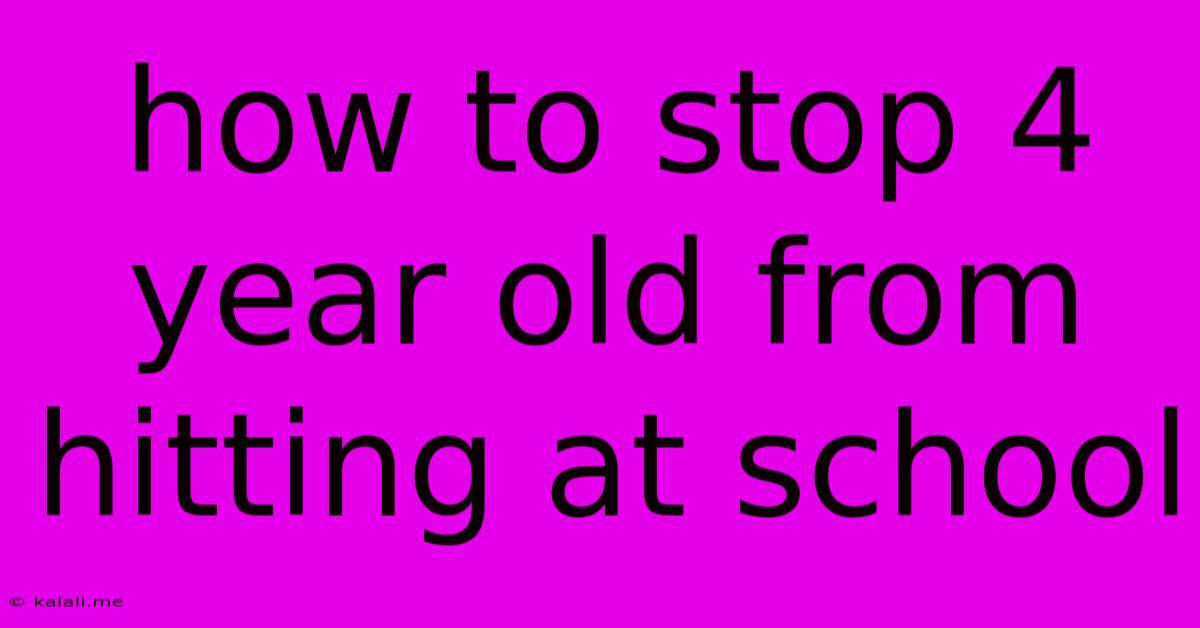How To Stop 4 Year Old From Hitting At School
Kalali
May 31, 2025 · 3 min read

Table of Contents
How to Stop a 4-Year-Old from Hitting at School: A Parent's Guide
Is your four-year-old hitting other children at school? This is a common preschool problem, but it's crucial to address it effectively. This article provides practical strategies for parents to work with teachers and therapists to help their child learn more appropriate ways to express their frustration and anger. Understanding the root causes and implementing consistent strategies at home and school are key to resolving this challenging behavior.
Understanding the "Why" Behind the Hitting
Before tackling solutions, it's important to understand why your child might be hitting. Four-year-olds are still developing their emotional regulation skills. Hitting can stem from various factors, including:
- Frustration and Anger: Inability to express feelings verbally or handle frustration appropriately. A simple toy dispute can escalate to physical aggression.
- Lack of Communication Skills: Difficulty articulating needs and wants clearly can lead to hitting as a way to get attention or what they want.
- Seeking Attention: Sometimes, hitting is a way to get a reaction, even a negative one, from adults or peers. Negative attention is still attention.
- Imitation: Children often learn behavior by observing others. They might be mimicking aggressive behavior seen at home, on TV, or even at school.
- Sensory Overload: Overwhelming environments or sensory sensitivities can trigger aggressive outbursts in some children.
- Underlying Developmental Issues: In some cases, hitting might be linked to underlying developmental delays or conditions.
Collaborative Strategies: Home and School Partnership
Addressing hitting requires a collaborative effort between parents and school staff. Open communication is essential.
- Regular Communication with Teachers: Maintain consistent contact with your child's teacher. Share observations about your child's behavior at home and ask for specific examples of incidents at school. This helps build a complete picture.
- Consistent Discipline: Discipline should be consistent both at home and school. Establish clear expectations about appropriate behavior and consequences for hitting. Consequences should be age-appropriate and focus on teaching, not punishment.
- Positive Reinforcement: Focus on rewarding positive behavior. When your child uses words to express anger or shares toys nicely, praise them generously. Positive reinforcement is far more effective than solely focusing on punishment.
- Role-Playing: Practice appropriate responses to frustrating situations at home. Role-playing scenarios involving sharing toys or dealing with anger can help your child develop coping mechanisms.
- Teaching Emotional Regulation Skills: Help your child learn to identify and label their emotions. Teach them simple coping strategies like taking deep breaths or counting to ten when feeling angry or frustrated.
Seeking Professional Help
If hitting persists despite your efforts, seeking professional help is crucial. A therapist or counselor specializing in child development can provide:
- Behavioral Therapy: Strategies to modify aggressive behavior and teach alternative coping skills.
- Developmental Assessment: To rule out any underlying developmental issues contributing to the behavior.
- Parenting Support: Guidance and support for parents in managing challenging behaviors.
Preventative Measures at School
- Structured Environment: A well-structured classroom with clear rules and routines can minimize frustration and aggression.
- Supervised Playtime: Close supervision during playtime helps prevent conflicts and intervene before hitting occurs.
- Conflict Resolution Skills: Teach children conflict resolution strategies. Learning to negotiate and compromise reduces the likelihood of resorting to physical aggression.
- Social Skills Training: Social skills training can help children learn how to interact appropriately with peers and manage social situations.
Stopping a four-year-old from hitting requires patience, consistency, and a team effort. By understanding the underlying causes, implementing effective strategies at home and school, and seeking professional help when needed, you can help your child develop healthier ways to express their emotions and build positive relationships with their peers. Remember, progress takes time, so celebrate small victories and maintain a supportive and understanding approach.
Latest Posts
Latest Posts
-
Linear Algebra And Its Applications 6th Edition
Jun 02, 2025
-
Can You Mix Green Antifreeze With Orange
Jun 02, 2025
-
How To Remove A Photograph Stuck To Glass
Jun 02, 2025
-
How Long Does It Take Coolant To Cool Down
Jun 02, 2025
-
Good Books On Probability And Statistics
Jun 02, 2025
Related Post
Thank you for visiting our website which covers about How To Stop 4 Year Old From Hitting At School . We hope the information provided has been useful to you. Feel free to contact us if you have any questions or need further assistance. See you next time and don't miss to bookmark.